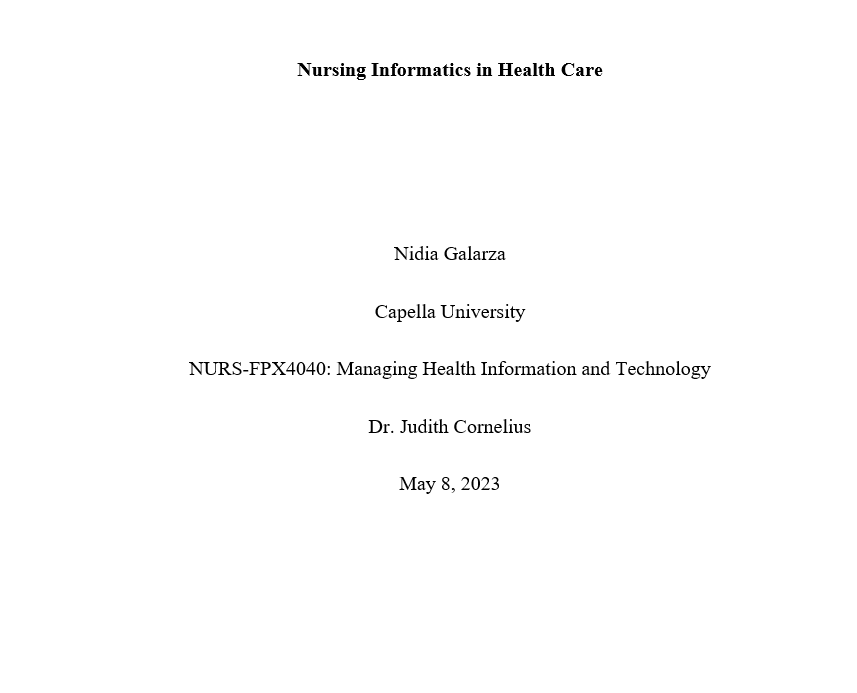Capella University
NURS-FPX4040: Managing Health Information and Technology
Dr. Judith Cornelius
May 8, 2023
Nursing Informatics in Health Care
Technological advancement is a primary component of the modern healthcare sector. The changes determine organization commitment to delivering high-quality and value-based services across the care continuum. Nursing informatics and nurse informaticists are among the concepts driving interactions between the care team and information management and patient care technologies. The two remind nurses about reforms in the industry and the need to demonstrate knowledge of and skills in health information systems. The emphasis is on making data-driven decisions that match the demand for evidence-based and patient-centered care.
Describing the Concepts of Nursing Informatics and Nurse Informaticist
Nursing informatics integrates clinical and technical aspects of health. The concept promotes meaningful and patient-centered innovations designed to improve outcomes for patients, the care team, and the organization. Enhanced clinical workflow is among the advantages that make nursing informatics relevant in modern health care system (Classen et al., 2018). According to the American Nursing Association, nursing informatics entails linking nursing practice with information and analytical concepts. The goal is to identify, manage and communicate data, information, and knowledge in nursing practices (Ceyhan et al., 2019). On the other hand, the nurse informaticist is a professional with technical skills appropriate for obtaining, analyzing, and strategizing about clinical data. The nurse informaticist understands medical economics, has excellent interpersonal relation skills, leadership experience, and understanding of nurse workflows (Otokiti, 2019). The knowledge and skills enable a nurse informaticist to collaborate with diverse colleagues to bridge the gap between clinical and technical aspects. The multiple roles of a nurse informaticist explain decisions by more hospitals to acquire the professional for consistent efforts toward optimizing safety and quality outcomes.
Nurse Informaticists in other Hospitals
Nurse informaticists are among the key human resources for hospitals seeking to increase competitive advantage through patient care technologies and health information systems. More hospitals acknowledge the need to invest in experts who understand business practices, medical economics, technologies, and growing demand for data-driven decisions (Classen et al., 2018). In this sense, nurse managers, chief nursing officers, and human resource managers deliberate on measures such as cost of hiring, training, and other incentives ideal for attracting competent nurse informaticists. The focus is on having individuals whose contributions and guidance help improve nursing workflows. Similarly, more organization recognize rising demand for effective management of information structures and processes across the continuum (Classen et al., 2018). This way, more organization will acquire nurse informaticists to help them integrate health information and technologies designed to improve patient care and transform service delivery. By having a nurse informaticist, more organization will make progress towards adopting technologies such as computerized provider order entry (CPOE), electronic health records, and other essential health information systems.
The Relevance of Nurses Engaging in Health Care Technology
Nursing informatics and nurse informaticists strengthen the nursing team’s engagement with health information and patient care technologies. The two remind nurses that they need information to optimize quality and safety of patient care. For instance, nurse informaticists deigned and implement training and development programs to equip nurses with essential technical knowledge and skills (Ceyhan et al., 2019). The practices enable nurses to access medical histories, medications, imaging results, and clinical notes from different healthcare professionals. Nurses’ engagement with technologies enables them to have a complete picture of a patient’s clinical status, values, and preferences (Murphy et al., 2020). Nurses can also participate in initiatives intended to facilitate development and improvement of healthcare technologies. Individual and collective suggestions help organization to identify new and better platforms for reducing medical errors, patient care delays, and costs.
Nurse informatics also makes the nursing team familiar with data privacy, confidentiality, and security rules. Training and education on patient health information protection make nurse responsive to data access privileges, password requirements, and timely reporting of intrusions (Tertulino et al., 2023). Similarly, nurses understand their roles as part of an interdisciplinary team responsible for enhancing vigilance and surveillance to prevent information infringement. With adequate technical skills, nurses become custodians of sensitive health information.
Opportunities and Challenges from Implementing Nurse Informatics
Nurse informatics adds multiple opportunities for the care team. The concept support individual and interdisciplinary practices such as staff training and education to optimize care outcomes using technologies. Since nurses form the largest component of the health care workforce, nurse informatics make the team familiar with EHRs and other technologies that help improve the quality of patient data (Ceyhan et al., 2019). In this case, hospitals benefit from a technically competent nursing team that understands information processing needs of patients, colleagues, and other healthcare providers. Further, the care team responds positively to calls for successful change management to help their organization adopt advanced clinical information systems.
Nurse informaticists ensure that nurses have the knowledge and skills to enable them collect, display, and process information and different encounters throughout the care process. However, challenges such as nurses with negative attitudes toward health information systems and patient care technologies may undermine adoption of nursing informatics. The implementation is also costly considering the demand for evidence-based practice tools relevant for promoting data-driven decision-making. Despite the challenges, nursing informatics improve health care quality and safety by enabling the care team to visualize and respond holistically to patients’ demands.
Summary and Recommendation
Nursing informatics and nurse informaticists are inevitable in a rapidly changing healthcare environment. The two enable organizations to incorporate nursing, information systems, and analytical sciences to maintain clinical data and support nursing practice. Findings by Ceyhan et al. (2019) revealed that nursing informatics enable hospitals to make significant progress towards embracing technologies such as computerized provider order entry, EHRs for processing lab test results, progress notes, nursing notes, and medications. Specifically, there are opportunities to combine data, information, and knowledge to provide high-quality and safe patient care.
The gains from nursing informatics outweigh drawbacks due to enhanced ability to make data-driven decisions from medical histories, interdisciplinary team notes, and other health-related information. Additionally, the nursing team has a complete view of patients’ needs and expectations (Heath, 2018). A nurse informaticist will implement training and education that empower nurses to play proactive roles in supporting continuous development and improvement of health information technologies. Notable gains include reduced medical errors, patient care delays, and health care costs.
Acquiring a nurse informaticist is a milestone for the hospital to have a workforce with strong analytical and critical thinking skills. The nursing will acquire positive attitudes that motivate them to work with technologies, enjoy problem-solving roles, and dedicate time and energy toward delivering exceptional services. The primary consideration is seeking candidates with knowledge and experience in evidence-based practice, database management, clinical information systems, health information security and privacy, and leadership.
References
Ceyhan, O., Senturk, A., Karadag, S., & Kilic, Z. (2019). Nurses’ status of using information systems and opinions about the benefits to the profession: Example of a country. International Journal of Caring Sciences, 14(1), 642-653. https://www.internationaljournalofcaringsciences.org/docs/68_ceyhan_original_14_1.pdf
Classen, D., Li, M., Miller, S., & Ladner, D. (2018). An electronic health record-based real-time analytics program for patient safety surveillance and improvement. Health Affairs, 37(11), 1-8. https://pubmed.ncbi.nlm.nih.gov/30395491/
Heath, S. (2018). Patient health data access top-of-mind in ONC draft framework. https://patientengagementhit.com/news/patient-health-data-access-top-of-mind-in-onc-draft-framework
Murphy, Z. R., Wang, J., & Boland, M. V. (2020). Association of electronic health record use above meaningful use thresholds with hospital quality and safety outcomes. JAMA Network Open, 3(9), 1-13. https://jamanetwork.com/journals/jamanetworkopen/fullarticle/2770283
Otokiti, A. (2019). Using informatics to improve healthcare quality. International Journal of Health Care Quality Assurance, 32(2), 425-430. https://pubmed.ncbi.nlm.nih.gov/31017059/
Tertulino, R., Antunes, N., & Morais, H. (2023). Privacy in electronic health records: A systematic mapping study. Journal of Public Health, 1-18. https://link.springer.com/article/10.1007/s10389-022-01795-z



